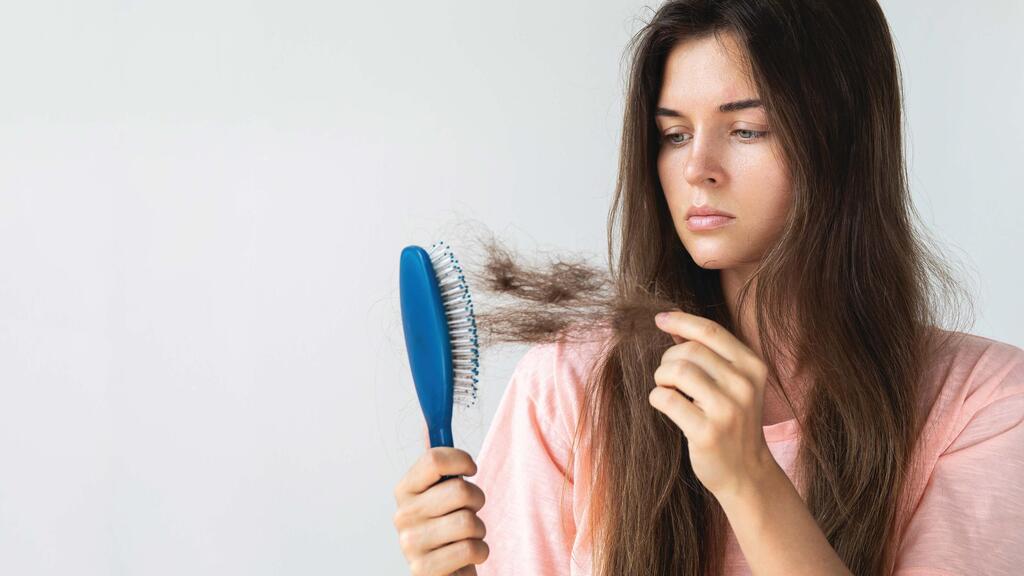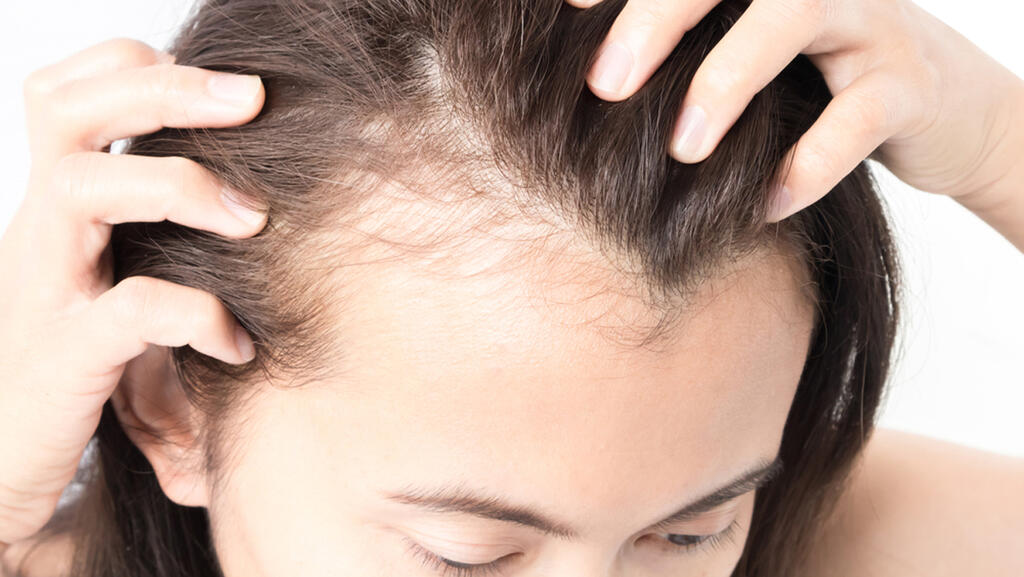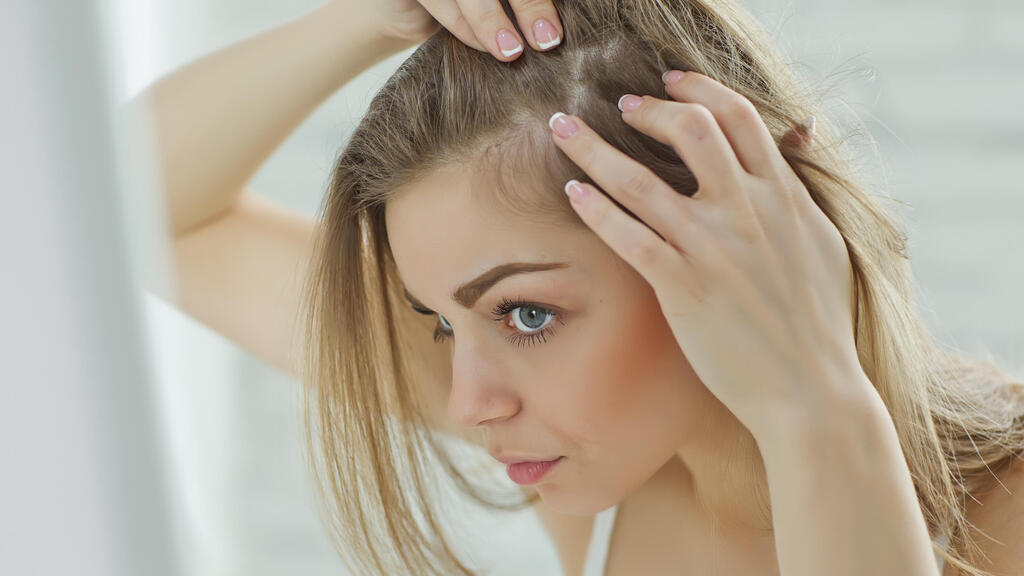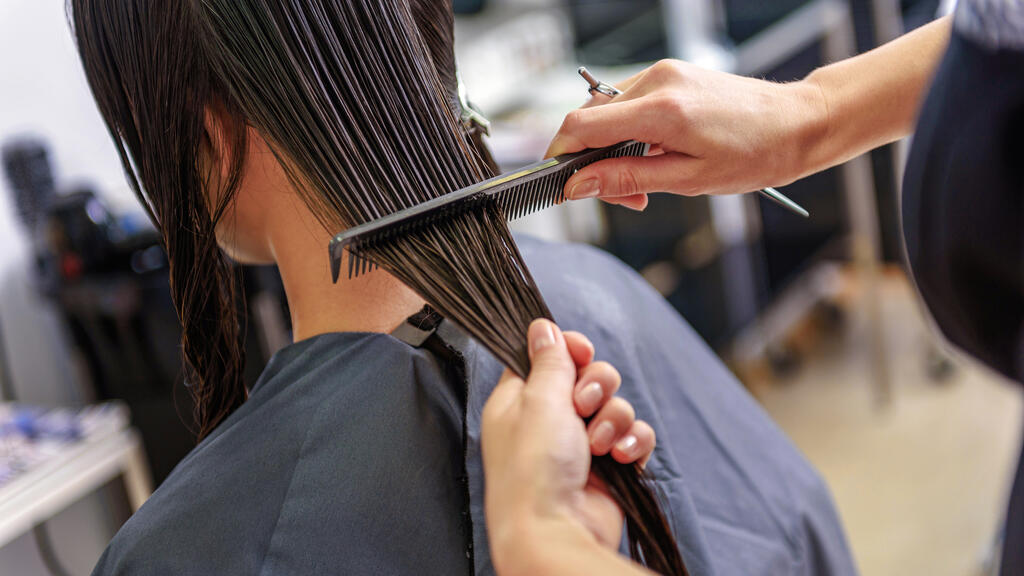Getting your Trinity Audio player ready...
If you're on social media, you may have already stumbled upon recommendations for dietary supplements, new cosmetic treatments, multiple hair care products, and a general sense of panic surrounding the collectively sensitive topic - hair loss.
Read more:
The COVID pandemic amplified this obsessive preoccupation with hair loss, given it had been reported as one of the symptoms experienced by patients. "When there is a two-year pandemic, and we are all confined at home, stressed, experiencing a change in daily routines, and widespread sickness - the resting stage in the hair growth cycle is impacted and thus a large portion of the population suffers from increased hair loss," said Dr. Libi Kohavi, a dermatologist and sex doctor, specializing in scalp and hair diseases.
However, before rushing to seek treatments and supplements, it's essential to understand what hair loss is and when intervention is actually necessary. "Hair loss is natural," Dr. Kohavi explained, "we all shed hair. It's normal to lose an average of 50-150 hairs per day. Hair completes its life cycle, and we part ways with it, beginning the growth of new hair. The hair follicle continues to produce new hair. It's important not to panic."
What should you keep an eye out for?
"When we experience significant hair thinning, if the front hairline disappears, or if there are changes in the eyebrows or eyelashes. If an abnormal amount of hair is left on the hairbrush, or suddenly, there is hair everywhere in the house, if you wake up in the morning and find a noticeable amount of hair on the pillow - these are signs that should prompt us to consult a dermatologist and seek advice.
"Hair loss can be divided into two main groups - reversible hair loss and permanent hair loss - and each group contains sub-groups. Reversible hair loss can be influenced by hair cycle, hormonal factors, environmental factors, or certain diseases, but as mentioned, these are all reversible. In permanent hair loss, there is fibrotic damage to the hair follicle, meaning the follicle itself is affected, and therefore, it won't produce new hair, and there is no way to restore it. An example of a disease belonging to this group is systemic lupus erythematosus (SLE), a condition that should be diagnosed early to prevent future damage."
"Stress is one of the significant triggers for hair loss issues," said Karin Albechari, the leading trichologist at "Hair Clinic," which offers hair and scalp diagnostic and treatment services based on trichological examination. "Hair is less vital for our survival, so it is the first to be affected due to stress. However, hair loss is merely a symptom, and to address the problem of hair loss or tired, sick, thin, or brittle hair, we need to diagnose the mechanism of the hair and understand its source. The COVID-19 pandemic created a combination of stress and inflammation in the hair follicles.
"This is a symptom similar to a genetic effect, a condition where there is inflammation in the hair follicle that is not visible and affects the surroundings and root function. In the case of COVID-19, the inflammation was triggered by the disease, meaning, if the individual hadn't had COVID-19, they probably would not have suffered from hair problems. One might mistakenly think it is a genetic issue, but, in fact, it manifests itself in the hair follicle area in the same way."
It's not all in the genes
We've already brought up genetics, so let's shed some light on the matter - while you might think that you can assess your hair's condition based on your family history, you'll be surprised to find out that the two aren't necessarily correlated. "Even if your parents have full, perfect, and abundant hair, it doesn't mean you will," says Dr. Kohavi. "Genes change over time, and we also have genes from previous generations."
She added that "just as there are ways to take care of facial skin, there are also very effective ways to care for your hair. You need to know how to nurture your hair and take care of it."
How should hair loss be diagnosed?
"Hair is a part of our body, and it gives us clues about processes occurring within it," explained Dr. Kohavi. "Dermatologists study hair and scalp diseases as part of their specialization, some focus more on it, and others less, but in my opinion, dermatologists are our best address. Diagnosis is the key to proper treatment because it's essential to understand the root cause of the problem. A thorough medical history needs to be examined, blood tests studied, and if necessary, further tests should be conducted. It's not enough for a patient to tell me, 'I didn't bring blood tests because everything was normal.' When I examine the blood tests of a patient suffering from hair loss, I don't just look for overall normal values. The values that matter for hair loss are different from our regular norms. These are subtle details that need to be known and attended to."
What does that mean?
"It means checking with a special device that helps diagnose the scalp condition. If needed, a scalp biopsy or imaging can be done. There are various tools that assist in achieving the correct diagnosis. After the diagnosis, the appropriate treatment can be chosen. It is crucial to remember that some scalp diseases can indicate underlying systemic diseases. For example, I had a patient who suffered from recurrent miscarriages, and we diagnosed the cause through her scalp."
What types of treatments are available?
"Treatments range from nutritional supplements and topical agents to hair transplantation - correct diagnosis is the key to customizing the treatment," clarified Dr. Kohavi. "For example, if we diagnose an overall vitamin deficiency, I might recommend taking a vitamin complex. If there's a specific vitamin deficiency, we focus on that particular one. It's essential to remember that these are delicate balances, and they need to be administered correctly. Another option is topical agents, such as scalp-cleaning substances and agents for encouraging hair growth.
"The choice of option depends on the goal we want to achieve, how long the substance remains on the scalp, the method of use, and, most importantly - how we, as consumers, use it - do we follow the instructions? Are we consistent? If we diagnose genetic hair loss, we need to focus on preserving the existing condition. We can't invent hair, so we preserve it."
How important is diet and nutrition in hair care?
"From my perspective, nutrition is the foundation of taking care of our bodies. It should be balanced. Just as we invest thought into other things, it's recommended to invest thought into what we eat, so that we receive the essence of food - minerals and vitamins. In any chosen diet, we should ensure we remain balanced."
Is there a way to prevent hair loss?
"We must understand that the moment our hair sheds, it's natural, it's part of the body's proper function, just like menstruation. The hair cycle is cyclical, and that's normal. We need to pay attention to the warning signs we discussed earlier, and if they occur, seek diagnosis and treatment."
How can we maintain healthy hair? "
First, we all live with stress, so let's all relax. It's easy to say and difficult to do, even for me, but it's essential to understand that stress affects our lives, all body systems, and also our hair. It's important to eat healthy and take care of ourselves and our bodies. It all comes together. If we recognize the warning signs, we should turn to a doctor, get diagnosed, receive treatment, undergo preservation treatments with qualified professionals, perform the treatment when we are ready for it, ensure that all parameters are at the right stage so that we don't waste resources, pain, and money. That's the key to success."
Hair care tips from a professional - Karin Albechari explains the dos and don'ts of hair treatment:
- Permanent hair straightening is a big no-no. This breaks your hair, and in many cases leads to scalp problems. The aggressive chemicals used can cause skin allergies, dryness, and dandruff.
- Make sure your hair is dry and loose. Wet hair is more fragile, and if your hair is thin, even slight friction with the pillow can cause damage.
- Focus on your scalp while washing your hair. Shampoo is irrelevant and unnecessary for the hair itself. Your scalp, on the other hand, needs shampoo like your skin needs soap. Therefore, make sure you choose a suitable shampoo for your scalp. If it's a high-quality shampoo, it will leave your hair smoother than other shampoos that might leave it very dry.
- Let your towel gently soak up the moisture. When drying your hair, don't aggressively scrub with your towel, because this can cause breakage.
- Go to a professional hairstylist for your dye job. Even if you use ammonia-free hair dye, it's important that whoever's doing it knows what they're doing.
- Use a wide hairbrush. When detangling your hair, brush out your ends first, and then go upwards - not the other way around. It's also better to brush dry hair if possible, and if not, use some kind of detangling product while brushing.
- Say goodbye to your flat iron and use hair dryers with adjustable temperatures. Yes, it might be harder to work with lower heat, but it's much less damaging to the hair this way.





